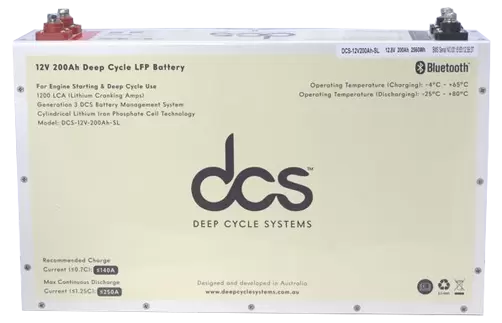In recent years, the automotive industry has seen a surge in the popularity of lithium-starting batteries, heralding a new era in engine performance. These lightweight and efficient power sources are not just a trend but a transformative upgrade for vehicles, offering benefits that significantly outpace their traditional counterparts. As more manufacturers and consumers embrace this technology, it becomes crucial to understand what makes a lithium starting battery a game-changer.
The Science behind Lithium-Starting Batteries
The science behind lithium-starting batteries revolves around the principles of electrochemistry and the unique properties of lithium-ion technology. Unlike traditional lead-acid batteries, which rely on chemical reactions involving lead and sulfuric acid, lithium-starting batteries utilise lithium compounds as the primary active material. This design enables higher energy density, allowing these batteries to store more energy in a smaller, lighter package.
At the heart of a lithium-starting battery are two electrodes: the anode and the cathode. The anode is typically made of graphite, while the cathode is composed of lithium metal oxide. During discharge, lithium ions move from the anode to the cathode through an electrolyte, generating an electric current that powers the vehicle’s starter motor. Conversely, lithium ions flow back to the anode during charging, replenishing the battery’s energy.
Another critical advantage of lithium-starting batteries is their ability to deliver high-cranking currents rapidly. This is due to the low internal resistance, allowing efficient energy transfer. Lithium batteries exhibit a low self-discharge rate, retaining their charge for extended periods, making them suitable for vehicles that are not used frequently.
 Benefits of Lithium-Starting Batteries for Vehicles
Benefits of Lithium-Starting Batteries for Vehicles
Lithium-starting batteries offer numerous advantages for vehicles, making them an increasingly popular choice among drivers. Here are some key benefits:
- Lightweight Design: One of the most significant advantages of a lithium-starting battery is its lightweight nature. Weighing considerably less than traditional lead-acid batteries, lithium batteries help reduce the vehicle’s overall weight, improving fuel efficiency and performance.
- High-Cranking Power: A lithium-starting battery delivers superior cranking power, ensuring reliable engine starts in various conditions. This is especially advantageous in cold weather, where traditional batteries may struggle to provide sufficient power.
- Fast Recharge Times: Lithium batteries recharge much faster than their lead-acid counterparts. This rapid charging capability allows drivers to get back on the road faster, making them ideal for vehicles that require quick turnarounds, such as race cars and recreational vehicles.
- Extended Lifespan: A lithium-starting battery can last up to 10 years or more, significantly outpacing a lead-acid battery’s typical three to five years. This longevity translates into lower replacement costs over time.
- Reduced Maintenance: Lithium batteries require minimal maintenance compared to traditional options. With no need for regular checks to prevent sulfation or fluid levels, they provide a hassle-free power solution, allowing drivers to focus more on their journeys.
Comparing Lithium-Starting Batteries to Traditional Options
When comparing lithium-starting batteries to traditional lead-acid options, several vital differences highlight the advantages of lithium technology. One of the most notable benefits of a lithium-starting battery is its weight. Lithium batteries are significantly lighter, which enhances vehicle performance and efficiency by reducing the overall weight of the power system.
Performance is another critical factor; a lithium-starting battery delivers higher cranking power, providing reliable starts in various conditions, including extreme temperatures. This efficiency allows for faster recharging times, enabling quicker recovery after heavy usage, which is particularly beneficial for off-road and recreational vehicles. Lithium-starting batteries outshine traditional lead-acid batteries, lasting up to 10 years or more with proper care, whereas lead-acid options typically last three to five years.
This longevity results in lower overall replacement costs and reduced environmental impact. Lithium batteries are less susceptible to sulfation, a common issue with lead-acid batteries that can impair performance over time. Although lithium-starting batteries often come with a higher initial investment, their long-term performance, reliability, and durability make them a compelling choice for modern vehicles seeking optimal power solutions.
Applications of Lithium Starter Batteries
Lithium-starter batteries are increasingly used in various applications due to their superior performance, lightweight design, and enhanced efficiency. One of the primary applications is in the automotive industry, where they power high-performance vehicles, motorcycles, and recreational vehicles (RVs). Their ability to deliver high-cranking currents ensures reliable starts, even in extreme weather conditions, making them ideal for performance-oriented and seasonal vehicles.
Another significant application is in marine settings, where lithium starter batteries are favoured for their resilience and weight savings. They enhance the performance of boats and personal watercraft, providing consistent power for starting engines and operating onboard electronics without the added weight of traditional batteries. Lithium-starter batteries are gaining traction in the power sports industry, powering all-terrain vehicles (ATVs) and snowmobiles.
Their lightweight nature contributes to improved handling and acceleration, which is crucial for off-road enthusiasts. In emergency and backup power, these batteries are increasingly used in generators, providing reliable starting power and efficient operation. Their long lifespan and low self-discharge rates make them an excellent choice for critical systems requiring dependable performance.
Installation and Maintenance Tips for Lithium-Starting Batteries
Properly installing and maintaining lithium-starting batteries is essential for maximising their performance and longevity. Here are some critical tips to ensure optimal use:
Follow Manufacturer Guidelines
Always refer to the manufacturer’s instructions for installation. Ensure compatibility with your vehicle and pay attention to polarity and connection points. Proper installation is crucial to prevent electrical issues and ensure safe operation.
Use High-Quality Connectors
Investing in quality connectors and cables is vital for adequate electrical flow. Corrosion can impede performance, so inspect and clean battery terminals and connections regularly. Securely fasten connections to avoid vibrations, which can lead to wear and tear.
Monitor Battery Charge Levels
Lithium-starting batteries have a lower self-discharge rate but still require regular monitoring. To maintain optimal charge levels, utilise a battery management system (BMS) or smart charger. Avoid deep discharges, as this can negatively impact the battery’s lifespan.
Manage Temperature Conditions
Lithium batteries perform best within a specific temperature range. If your vehicle is subjected to extreme heat or cold, consider insulating the battery or parking in a temperature-controlled environment to maintain stability.
Conduct Regular Maintenance Checks
Periodic inspections are essential. Look for any signs of damage, such as swelling or cracks, and address issues promptly. Keeping an eye on performance indicators, such as cranking power, can help ensure your lithium-starting battery operates efficiently.
Environmental Impact of Lithium-Starter Batteries
Lithium-starter batteries are increasingly recognised for their positive environmental impact compared to traditional lead-acid batteries. One of the primary advantages is their longer lifespan, often lasting two to three times longer. This durability means fewer batteries end up in landfills, reducing waste and the environmental burden associated with battery disposal.
Moreover, lithium-starter batteries are generally more energy-efficient, requiring less energy to manufacture and charge. Their lightweight design improves vehicle fuel efficiency, lowering greenhouse gas emissions over time. As cars consume less fuel, they generate fewer emissions, positively impacting air quality and mitigating climate change.
However, the environmental benefits of lithium-starter batteries must be weighed against the ecological implications of lithium extraction. Responsible sourcing and sustainable practices in lithium mining are crucial to minimising the environmental footprint of these batteries. Innovations in recycling technologies are also emerging, enabling the recovery of lithium and other valuable materials from used batteries, further reducing the environmental impact.
Common Myths and Misconceptions about Lithium-Starting Batteries
Despite the growing popularity of lithium-starting batteries, several myths and misconceptions persist regarding their use in vehicles. One common myth is that lithium batteries are inherently unsafe and prone to catching fire. While it’s true that poor-quality lithium batteries can pose risks, reputable brands are designed with advanced safety features that minimise the chances of overheating and thermal runaway.
Another misconception is that lithium-starting batteries cannot be used in extreme temperatures. These batteries perform well in a wide range of temperatures, often better than traditional lead-acid batteries. Their ability to deliver high-cranking power in cold weather suits them for various climates.
Some people believe that lithium-starting batteries require complex maintenance. However, they are relatively low-maintenance compared to lead-acid options, as they don’t need regular checks for electrolyte levels or sulfation issues. There is a notion that lithium batteries are costly without significant benefits. While the initial investment may be higher, their longevity and performance can lead to cost savings over time.
Choosing the Right Lithium Starter Battery
Choosing the right lithium-starter battery requires a thoughtful evaluation of your vehicle’s needs and driving habits. Start by assessing your vehicle’s specific requirements, including engine size and electrical system specifications. Ensuring the lithium starter battery has the correct cranking power and capacity for your car will avoid performance issues.
Usage patterns play a critical role; frequent drivers might prioritise batteries with faster recharge times and higher energy density, while occasional drivers might benefit from batteries with lower self-discharge rates. It’s also important to consider the battery’s physical size and terminal configuration to ensure a proper fit within your vehicle’s battery compartment. Budget is another significant factor.
While lithium-starter batteries typically come with a higher initial price tag, their extended lifespan and reduced maintenance costs can provide long-term savings. To maximise your investment, look for batteries that offer a good balance of performance and price. Pay attention to the manufacturer’s warranty and customer support. A robust warranty can offer peace of mind and protection against potential defects. Manufacturer support is also valuable for troubleshooting and ensuring you get the most out of your battery.
Conclusion
In summary, adopting lithium-starting batteries marks a significant advancement in automotive technology. Their lightweight design, superior cranking power, and extended lifespan make them ideal for enhancing vehicle performance. As more drivers recognise the benefits of these batteries, they can expect improved reliability and efficiency in their engines. Embracing this innovative power source boosts performance and contributes to long-term cost savings and environmental sustainability.
FAQs
How does a lithium-starting battery compare to lead-acid batteries?
A lithium-starting battery has several advantages over lead-acid batteries. It is significantly lighter, which can improve vehicle performance and fuel efficiency. Additionally, a lithium-starting battery provides higher cranking power and faster recharging capabilities, allowing for reliable starts even in extreme conditions.
What are the benefits of using a lithium-starting battery in my vehicle?
Using a lithium-starting battery in a vehicle offers numerous benefits, including reduced weight, extended lifespan, and increased power output. This battery type is also less prone to sulfation, which affects lead-acid batteries, and ensures reliable performance over time.
Can a lithium starting battery be used in all types of vehicles?
A lithium starting battery can be used in various vehicles, including cars, trucks, and recreational vehicles. However, to ensure optimal performance, it’s essential to check compatibility with the specific vehicle’s electrical system.
How long does a lithium-starting battery last?
Depending on usage and maintenance, a lithium-starting battery can typically last up to 10 years or more. This longevity far exceeds that of traditional lead-acid batteries, which usually last three to five years.
Are there any special maintenance requirements for a lithium-starting battery?
A lithium-starting battery requires minimal maintenance compared to lead-acid batteries. Regular checks of the battery’s terminals and ensuring a secure connection are recommended, but overall maintenance is straightforward, contributing to its long lifespan and reliability.
| Other Good Articles to Read |
| Blogs-Nation |
| Blogs-Peoples |
| Bryan Smith Blogs |
| Intellect Blogs |
| The Fault In Our Blogs |
| Blogs Eu |
| Oz Forums |
| Recruitment Blogs |
| Zet Blogs |
| Id Blogs |
| Blogs Tudiolegale |
| Blogs Map |
| Related Business Listings |
| Contact Directory |
| Local Business Profiles |



